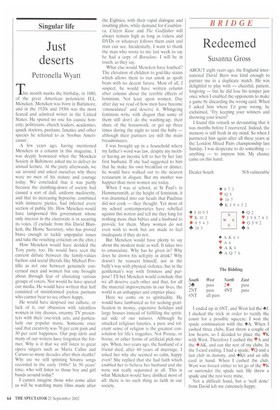Just deserts
Petronella Wyatt
his month marks the birthday, in 1880, of the great American polemicist H.L. Mencken. Mencken was born in Baltimore, and in the 1920s and 1930s was the most feared and admired writer in the United States. He spared no one his caustic honesty; politicians, church leaders, academics, quack doctors, puritans, fanatics and other species he referred to as 'boobus American us'.
A few years ago, having mentioned Mencken in a column in this magazine. I was deeply honoured when the Mencken Society in Baltimore asked me to deliver its annual lecture. At the party afterwards, we sat around and asked ourselves why there were no men of his stature and courage today. We concluded that it was partly because the dumb ing-down of society had caused a sort of dull, uniform mediocrity, and that its increasing hypocrisy, combined with insincere pieties, had infected every section of public life. How Mencken would have lampooned this government whose only interest in the electorate is in securing its votes. (I exclude from this David Blunkett, the Home Secretary, who has proved brave enough to tackle unpopular issues and take the resulting criticism on the chin.) How Mencken would have derided the Tory party, too. He would have seen the current debate between the family-values faction and social liberals like Michael Portillo as not one between genuinely concerned men and women but one brought about through fear of alienating various groups of voters. Nor would he have spared our media. He would have written that half consisted of misinformed joyless puritans who cannot bear to see others happy.
He would have despised our culture, or lack of it, our obsession with talentless women in tiny dresses, smarmy TV presenters with their one-trick acts, and particularly our popular music. Someone once said that creativity was 70 per cent pain and 30 per cent happiness. Our pop idols and many of our writers have forgotten the former. Why is it that we still listen to great opera singers such as Maria Callas and Caruso so many decades after their deaths? Why are we still spinning Sinatra songs recorded in the early 1940s? In 50 years' time, who will listen to those boy and girl bands around today?
I cannot imagine those who come after us will be watching many films made after
the Eighties, with their vapid dialogue and insulting plots, while demand for Casablanca, Citizen Kane and The Godfather will always remain high as long as videos and DVDs or whatever follows them exist and man can see. Incidentally, I want to thank the man who wrote to me last week to say he had a copy of Borsalino. I will be in touch, as they say.
What else would Mencken have loathed? The elevation of children to god-like status which allows them to run amok as spoilt brats with no decent future. Most of all, I suspect, he would have written column after column about the terrible effects of feminism. Not least upon women. Day after day we read of how men have become 'emasculated' and deserve it. Whingeing feminists write with disgust that some of them still don't do the washing-up, their share of the housework, or get up three times during the night to tend the baby — although their partners are still the main breadwinners.
I was brought up in a household where my father's word was law, despite my mother having an income left to her by her late first husband. If she had suggested to him that he make his own breakfast or dinner, he would have walked out to the nearest restaurant in disgust. But my mother was happier than most women are today.
When I was at school, at St Paul's in Hammersmith, at the height of feminism, it was drummed into our heads that Paulinas did not cook — they thought. Yet most of my school contemporaries have rebelled against this notion and tell me they long for nothing more than babies and a husband to provide for them. Many women do not even wish to work but are made to feel inadequate if they do not.
But Mencken would have plenty to say about the modern male as well. It takes two to emasculate. Why has he given in? Why does he drown his self-pity in drink? Why doesn't he reassert himself, not in the bully's way with physical violence, but in the gentleman's way with firmness and purpose? I'll bet Mencken would conclude that we all deserve each other and that, for all the material improvements in our lives, the world is an unhappier and emptier place.
Here we come on to spirituality. He would have lambasted us for seeking gratification in money, expensive holidays and large houses instead of fulfilling the spiritual side of our natures. Although he attacked religious fanatics, a pure and tolerant sense of religion is the greatest consolation for life's tragedies. Not Prozac, or booze, or other forms of artificial pick-meups. When, two years ago, the husband of a friend died, after 60 years of marriage, I asked her why she seemed so calm, happy even? She replied that she had faith which enabled her to believe her husband and she were not really separated at all. This is what Mencken would have disliked most of all: there is no such thing as faith in our society.










































































 Previous page
Previous page